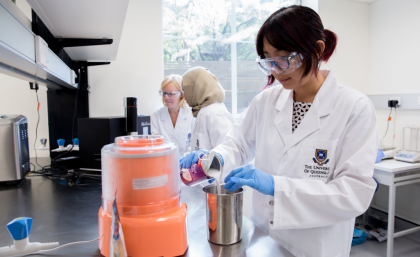UQ serves up new Food Science Innovation Precinct
Australia’s food-centric culture—illustrated by the popularity of dining out, healthy eating and television cooking shows—will benefit from a new $1-million facility at the University of Queensland.
UQ is serving up a smorgasbord of opportunity for the food industry with the opening of the new Food Science Innovation Precinct at the St Lucia campus.

Deputy Vice-Chancellor (External Engagement) Professor Iain Watson said UQ had worked hard to position itself as a research powerhouse in areas such as agriculture, land management, genetics and chemistry, which all feed into food innovation.
“UQ has the largest university food research capability in Australia and ranks at number seven in the world for agriculture research,” he said.
“The Food Science Innovation Precinct is the icing on the cake. It will give students access to world-class training, innovations and facilities, and will ultimately help food companies create more innovative products.”
The Food Science Innovation Precinct has two state-of-the-art laboratories—a food-grade laboratory and an analytical laboratory for chemical and microbiological analysis.
Master of Food Science students will have the opportunity to work on a range of projects, including
- cholesterol-lowering baked goods and dairy foods
- ultra-low-fat cheese that tastes like full-fat cheese
- 3D printed fruits
- fresher milk produced without heat pasteurisation
- new Omega-3 and probiotic foods and drinks
UQ Business School Entrepreneur in Residence and UniQuest Commercial Director (Food) Cameron Turner said the new facilities would allow students to work on research projects in collaboration with food companies.
“The food industry in Australia is rapidly growing and evolving, largely driven by consumers who are willing to pay for taste and convenience and are better informed about health and nutrition through media channels,” Mr Turner said.
“There’s also an increased awareness of functional foods and the importance of our gut microbiota, and rising opportunities in Asia, particularly China, for Australian-made foods.
“All of these factors create excellent opportunities for food manufacturers, retailers and our researchers.”
UQ announced in November a project to investigate if friendly bacteria could be introduced to bagged salad leaves to help ward off salmonella and listeria outbreaks.
UQ Master of Food Science and Technology
The Master of Food Science and Technology will cover the integrative disciplines of food science and food technology. In this program, you will gain a comprehensive theoretical and practical knowledge within fields of food science and food technology, and you will have the opportunity to apply these in either a research project or an industry placement.
Program: Master of Food Science and Technology
Location: St Lucia Campus, Brisbane
Duration: 1.5 years
Semester intakes: February and July
Application deadline: May 30 (July intake); November 29 (February intake)
Prerequisites: Bachelor degree in food science, food technology, science or engineering (in food science or technology) or an approved discipline. GPA of 5 or above on a 7-point scale.
Apply to the University of Queensland!
*

































Ask A Question
Ask us about your program of interest, or if you have a question about our services.
CONTACT US TODAY